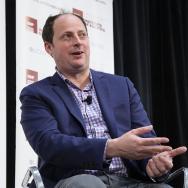Editor’s note: This is one in a series of stories spotlighting how faculty, students and alumni at the Harris School of Public Policy are driving impact for the next generation. Leading up to the May 3 grand opening of the Harris’s new home at the Keller Center, these stories will examine three of the most critical issues facing our world: strengthening democracy, fighting poverty and inequality, and confronting the global energy challenge.
When Emily Krone was asked to predict the 2018 midterm elections as part of her Harris School of Public Policy class, the graduate student had no idea she would nearly outperform, let alone meet the person who inspired many of her statistical models: University of Chicago alumnus Nate Silver.
In the weeks leading up to the election, the average national poll miscalculated the Senate outcome by 4.3 percentage points. Not only did Krone outpredict those polls by more than a full point, her model had a polling error of 3.2 percent—not far off Silver’s 2.1 percent.
“I follow politics very closely and listen to Nate Silver's FiveThirtyEight Politics podcast, where this is exactly what they do. They spend months out of the year building state-by-state models in the House and the Senate,” said Krone, referring to Silver, AB’00, who rose to fame in 2008 for his political prognostication. “I feel like I had picked up some tips and tricks, and I just knew what to think about as I was building my model.”
Last month Krone got the opportunity to interview Silver while he was attending an Institute of Politics event at the Keller Center that focused on the merits of predictions ahead of the 2020 election.
Given the criticism for failing to predict Donald Trump’s win in 2016, Krone wondered: Was Silver making any changes to his prediction model as a result?
“Not a lot, because we think that we have a really good model, and it was a model that gave Trump a much higher chance than other models did,” said Silver, who had given Trump a 29 percent chance of winning in 2016—more than twice the forecast of others. “Every year, we go back and look at every single piece of code, because you always get smarter, and hopefully you become wiser after four years, and you realize, ‘Oh, here is a technique I think I was using before that I can make a little better.’”
Krone asked Silver what he thought has changed the most regarding the relationship between data and politics since he became famous for so closely predicting the outcome of the 2008 presidential election.
“The extent to which election forecasting, as opposed to polling itself has become a central part of the discourse around campaigns,” Silver said. “Which in some ways is not what you want, right? In some ways you want to vacuum seal the campaign and say, ‘Okay, I'm just looking at it from the outside, and nothing I could possibly do would affect the discourse around the campaign, would affect campaign strategies.’ We're just scientist[s or reporters] trying to understand the world. So the fact now that [predictions] affect perception of the campaign—that I'm influential in some ways—is something that you don't want necessarily.”
Krone is aware of the need for responsible polling, especially as the general voting public gives such figures more and more import.
“It's always great to have data out there, but you can twist the numbers any way you want to make them say what you want,” Krone said. “To have a robust understanding of how that's done, and to make sure that it's done in the most scientifically sound way possible—not biased—is important. And it's important to help people who don't have a policy degree or an economics degree to understand what goes into that.”
Despite her love of politics, Krone said she doesn’t have an interest in taking her statistical talents to Washington, D.C. She’s currently working as a research assistant at the University of Chicago Urban Labs, where she’s assisted on a project that aims to help individuals with mental illness transition to services in their communities after leaving Cook County Jail.
Krone feels her work in Chicago can make an immediate impact.
“As a research assistant, I’m testing out policies in the Chicago setting and doing vigorous trials of those policies in a space where it's not a lawmaker who makes something, and then five years later, we figure how it affected people,” Krone said. “I’m on the ground getting results pretty much immediately on how these policies are working and seeing how we can scale them up to all of Chicago or implement them in different cities and different contexts.”
—Adapted from a story that first appeared on the Harris School of Public Policy website.

